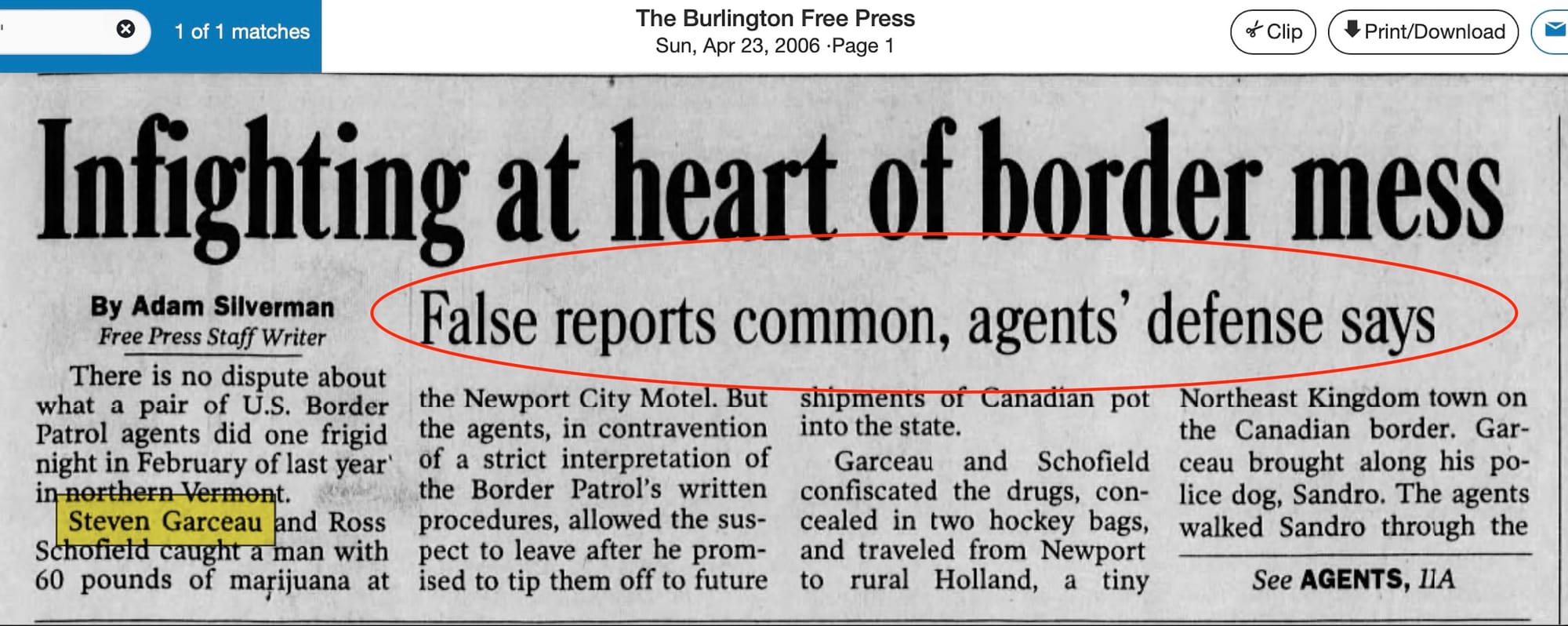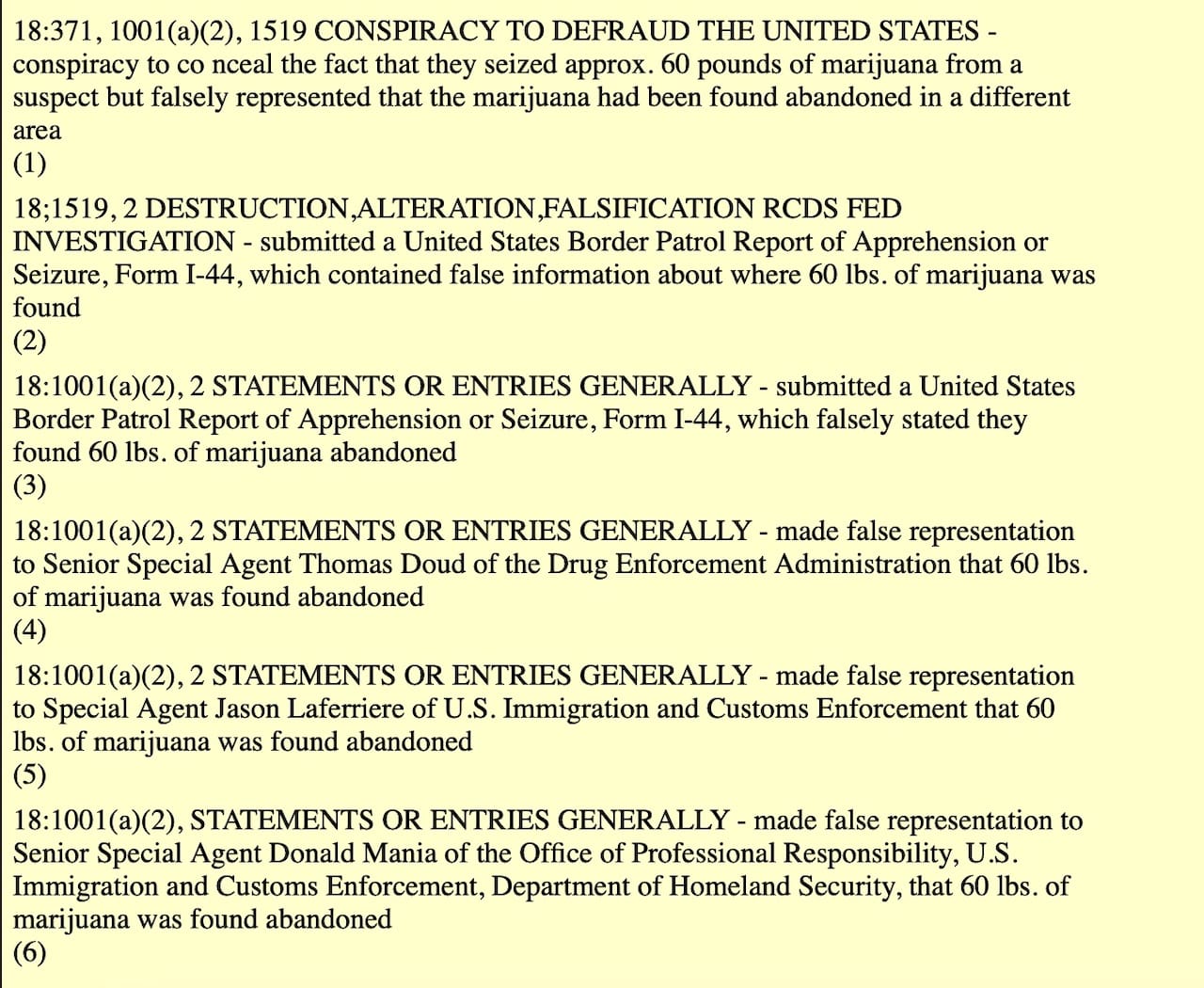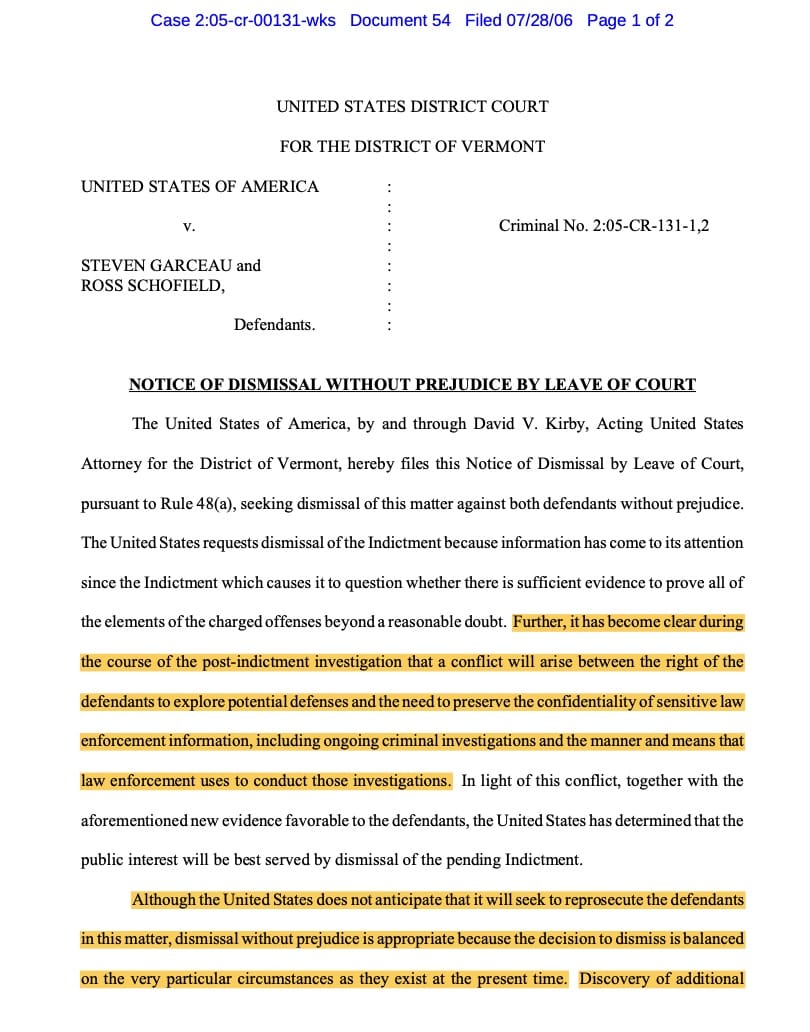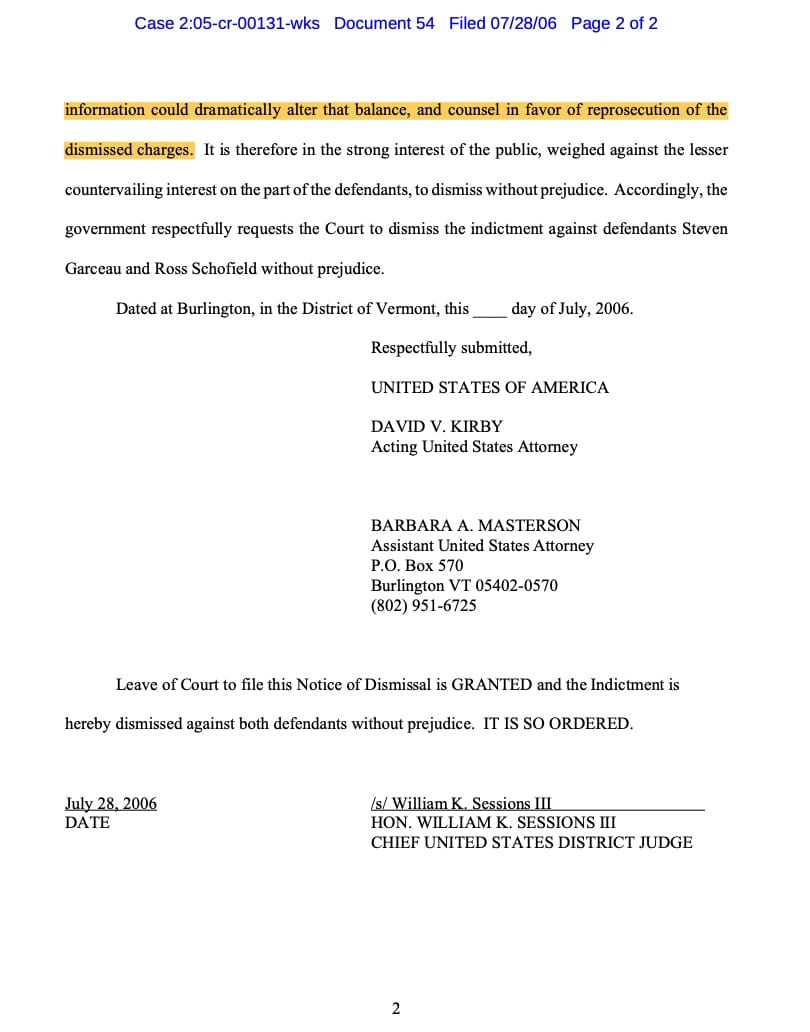Border Patrol: Lying is policy.
What we see here is a typical Border Patrol coverup where no one can recall their actions, they blame everyone and everything else, refuse to submit documents proving their innocence and then work to protect their own agents.

I can recall at the end of shift, processing a man who came back with a prior conviction of child sexual assault. I went into the supervisor’s office and told him I would have to pull a double because this man would need to be processed for 8 USC 1326, entering the US illegally after deportation as an adjudicated criminal alien. My supervisor ordered me to rescan his index fingerprints but use his thumbs instead so that I could go home on time This was a crime as I would be knowingly falsifying government data. I knew and watched agents do this all the time, but I never did it because it violated my personal values. I asked him if he was ordering me to lie, and he of course claimed he was not.
When I say that Border Patrol agents are trained to lie, the response from many is that I must prove it with documents. It’s not enough that I have showed how they have consistently lied to us in the last decade. People’s memories fade quickly as these are these chaotic times, and the need to only paint these agents as heroes runs deep in many.
Just off the top of my head, I can recall how they began inflating their assaults on agent statistics because they needed to portray migrants entering the country illegally as violent. It worked, and today we see ICE doing the same thing with the Department of Homeland Security claiming agents being assaulted has risen anywhere from five hundred percent to a thousand percent. And while they have given zero proof of these claims, we do have videos of many of those claims showing it was the agents doing the assaulting.
They claimed they were not separating families and taking the children of asylum seekers just because they entered the country illegally in 2018. In June of that year, they finally admitted they were lying and had been separating families for months. Today, we know they were separating children from their families as far back as June of 2017. They claimed they would only arrest the worst criminal immigrants, but we see them arresting children and the vast majority of those arrested, over seventy percent, have no prior criminal records or warrants. Although I knew this was a lie, you all did not know and the media pretended they did not know. They also lied about the criminality of those sent to CECOT, and so on.
When the boss of my station ordered us to stop finding the dead bodies of migrants because Latino rights organizations were rightly accusing our policies of deterrence of intentionally killing migrants, he stood in front of us and verbally ordered us to leave the bodies decaying out there. When we balked and said that was immoral, he ordered us to not go north of the first paved road which was where the vast majority of bodies were found. Then they began writing us up for disobeying orders if we continued tracking groups north of this road. This was done because President Clinton demanded his Operation Gatekeeper be portrayed as successful. They also demanded we lie and only process half of our apprehensions. This was also a verbal order.
The problem with proving that these agencies are ordering agents to lie is that they do not normally put orders to lie in print. There is also no current way to get ahold of memorandums and directives through Freedom of Information Act filings because Trump designated these agencies as “national security” agencies in his first administration to prepare for his second term. This means the agency can deny information by simply claiming “law enforcement sensitive” and do not have to tell you why it is sensitive.
Just a reminder, the Border Patrol has declared reports from their illegal and secret coverup teams known as Critical Incident Teams as “law enforcement sensitive” since 1987, and courts across the land have prevented attorneys and victims’ families from accessing these coverups.
But it just so happens that I have spent the last four years grabbing every Border Patrol court case and article I can find, and I happened to find a court case where Border Patrol agents were ordered to lie on government and court documents. This occurred in the Border Patrol Swanton Sector in the Newport, Vermont area in 2005. On November 17, 2005, a grand jury returned an indictment of Border Patrol agents Steven Garceau and Ross Schofield. Both were charged with six counts:

On February 5, 2005, Border Patrol agents Garceau and Schofield arrested a Canadian man with sixty pounds of marijuana. By law, the US Border Patrol had to turn this case over to either the Drug Enforcement Agency (DEA) or to Immigration and Customs Enforcement (ICE) - Homeland Security Investigations (HSI). The agents took the man and drugs to the Newport Border Patrol Station for processing, but let the man go after he promised to cooperate and become an informant for Agents Garceau and Schofield. He was to notify them of future drug loads coming into the country. However, the agents failed to notify their supervisor, the DEA and ICE as required by policy and law.
The paperwork required for a drug seizure and the arrest of a Canadian citizen were an I-44 and an I-213. The I-44 records the narcotics seized and shows who and when it was transferred to another agency. The I-213 is for the record of arrest of the Canadian citizen. These are official US government documents that are used to convict people of violating US laws and it is illegal to “make false, fictitious or fraudulent statements” on these documents as they are used in official government and court proceedings. It is illegal even for agents.
Instead of getting a supervisor’s approval to use the man as an informant and following the procedures and guidelines laid out by the agency, Agents Garceau and Schofield created an elaborate plan. Both agents wrote the reports claiming they had found the marijuana elsewhere, took the bags of drugs with them to that area, created a scene including using Garceau’s assigned Border Patrol K-9 to claim that the dog had led them to the bags. They reported that no suspect was discovered with the bags. They took photos of the made up crime scene as evidence. The agents also lied to the DEA and ICE officials when they created the falsified government documents. This is a crime these agents charge civilians with when they lie to them. Not only this, but they then lied to their own Border Patrol superiors and Garceau falsified the K-9 seizure report. When ICE’s internal affairs unit (Office of Professional Responsibility or OPR) investigated the agents, Garceau lied again telling the investigators he could “not recall” taking his K-9 to the area to make it appear that he had sniffed out the drugs.
Border Patrol agents Garceau's and Schofield’s defense was that they were trained to lie on government documents. They claimed that they were instructed to create falsified government documents in order to protect the informant and that this was policy. The agents stated that they created the false reports and that the agency’s press information office put out a fake press release announcing the seizure of the drugs showing there was no arrest of the informant, so that the informant would not be harassed by his suppliers.
But here’s the thing: there are clear policies of how to handle informants. All law enforcement interviewed in this case, be they ICE, DEA or Border Patrol, stated this was not the way to handle an informant according to their agency’s policies. Garceau’s and Schofield’s bosses and coworkers all stated they would never create an informant without guidance from their superiors. All stated that they had never falsified or created a fake crime scene and then recorded it on government documents, nor had they lied to their coworkers and superiors about doing such a thing. They all stated that policy and procedures in handling informants was to simply remove the informant’s name and replace it with an alias. Making someone an informant required supervisory approval, and creating a fake press release required Washington DC Headquarters approval. Superiors of Garceau and Schofield all denied approving of the agents’ actions. All stated that they had never been trained to create false reports, that they could not think of a time that they had been ordered to make a false report and that if ordered they would all refuse because they knew it was illegal.
Yet, that is what Agents Garceau and Schofield claimed they were trained and ordered to do. Their attorneys demanded the court order the release of manuals and policy directives showing that this was standard practice within the Border Patrol. As usual, the agency claimed “law enforcement sensitive” information, meaning the court and the defense attorneys could not have the documents that the agents claimed would exonerate them. The senior agent who approved the falsified press release, Mark Henry had retired and claimed he could not recall his approval. Other Border Patrol agents interviewed about the case claimed that Garceau and Schofield may have created false evidence and reports because I-44’s are FOIA-able. Again, the policy would have been to redact the informant’s name or make an alias.
Then suddenly, after admitting it was the “most bungled case” he’d ever scene, Border Patrol Assistant Chief John Pfeifer stated that Agent Garceau had lied before on an I-44 concerning a drug seizure but was ordered to do so by ICE and the US Attorney’s Office in 2003. The fake press release for this incident was approved by Assistant Chief Pfeifer and approved by Washington DC Headquarters. Again, they claimed the I-44 was falsified to match the press release.
What we see here is a typical Border Patrol coverup where no one can recall their actions, they blame everyone and everything else, refuse to submit documents proving their innocence and then work to protect their own agents. The claim here is that they cannot prove the agents are trained and ordered to lie on government documents because those government documents are secret, but they happen to remember doing this same thing two years ago demonstrating that in fact agents are ordered to lie and falsify government documents.


n the end, the prosecutors dropped the case but reserved the right to bring charges later. The agents’ defense that they were trained by policy and their superiors to falsify and lie on government documents is what forced the prosecutors to drop the charges.
Border Patrol agents are trained to lie, even on government documents.
Notes:
USA vs. Garceau et al. US District Court, District of Vermont, Burlington. Case #05-cr-00131-wks-1.
“Border Patrol agents indicted on drug conspiracy.” The Burlington Free Press, November 18, 2005, (3C).
Hemingway, Sam. “More indictments possible in U.S. Border Patrol case.” The Burlington Free Press, November 19, 2005, (17).
Silverman, Adam. “Infighting at heart of border mess.” The Burlington Free Press, April 23, 2006, (1, 11A).
